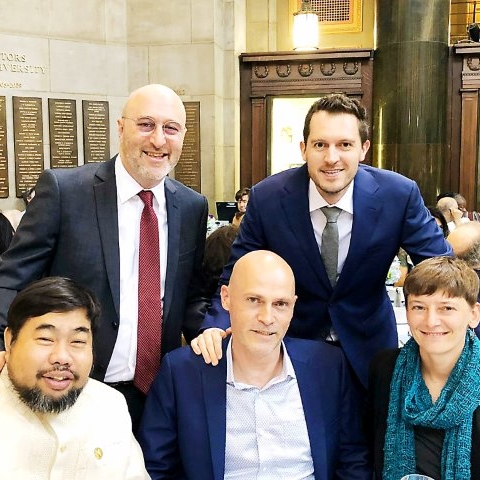News
Pulitzer Prize winning journalist credits Habonim for sense of social justice
“Habonim helped to instil in me a strong sense of social justice, and so contributed to the career path that I have chosen,” said Peter Hirschberg, who accepted the Pulitzer Prize for International Reporting at an awards ceremony in New York City last Wednesday. It is arguably the most coveted award for journalists.

TALI FEINBERG
This home-grown newshound was born in Cape Town, attended Herzlia, and played a leadership role in Habonim. He made Aliyah in 1988. He was head boy of Herzlia High School in 1983, and went on to marry the head girl of the same year, Chanine Odes. He completed a degree in Political Science from the University of Cape Town, and a Masters in Political Science at Hebrew University.
Hirschberg’s career began at the Jerusalem Post and Jerusalem Report, followed by seven years at the English edition of Ha’aretz where he was a founding editor. He then moved to Hong Kong and Bloomberg, and he is currently based in Australia for Reuters, where he manages the Asia Enterprise team, heading up investigative and enterprise coverage across Asia.
“The Pulitzer is extremely prestigious. Being part of the team that won the award is a great honour,” said Hirschberg, who is the Reuters Asia Investigative Editor of the team that won the award for its investigative journalism exposing a bloody drug crackdown in the Philippines.
“The work that won the award focused on the drug war in the Philippines that was unleashed by President Rodrigo Duterte when he came to power in June 2016. We worked for 18 months on exposing the methods employed by the police, and a campaign of what was essentially extra-judicial killings of people suspected of being involved in pushing or using drugs,” said Hirschberg.
“We revealed, for instance, how police were removing dead bodies after they had shot drug suspects dead, and rushing them to hospital as if they were still alive. But they were all dead on arrival at the hospital. This was a way for the police to muddy the evidence at crime scenes.
“A second story we did exposed a death squad that carried out multiple killings in a part of Metro Manila, further revealing the methods and tactics the police were using in the killings, which have largely been aimed at people in the poorer areas of the Philippines.”
Their work combined “shoe-leather” reporting (old fashioned journalism involving walking from place to place observing things and speaking to people, rather than sitting indoors at a desk) and data reporting. “We were able to obtain multiple police reports from the police, and to use those in our work, which made it very difficult for the authorities to refute our findings,” said Hirschberg.
His advice to journalists who want to achieve excellence is: “Be inquisitive and dogged, and don’t accept conventional wisdom.”
Others agree that Hirschberg’s background had a profound impact on his career: “I would say that Peter, like many Habonim graduates, has an inquiring mind. I would attribute that to the fact that Habonim nurtured in all of us the skill to introspect and assess all aspects of our lives, as Jews, as Zionists, and as people in general,” said his friend and contemporary, Neville Sweijd.
“We were taught to think critically and independently, and this is a critical skill for journalism and in many other aspects of life. I would say that Habonim education and leadership is really an asset in all of our lives.”
He pointed out that “being South African with a social conscience has been both a burden and an asset in that it has made us challenge authority and seek the truth while growing up in apartheid South Africa”, and that this might have had an impact on his commitment to fearless journalism.
After a whirlwind week post-Pulitzer, Hirschberg will head back to Australia to resume work on another series of investigative stories.